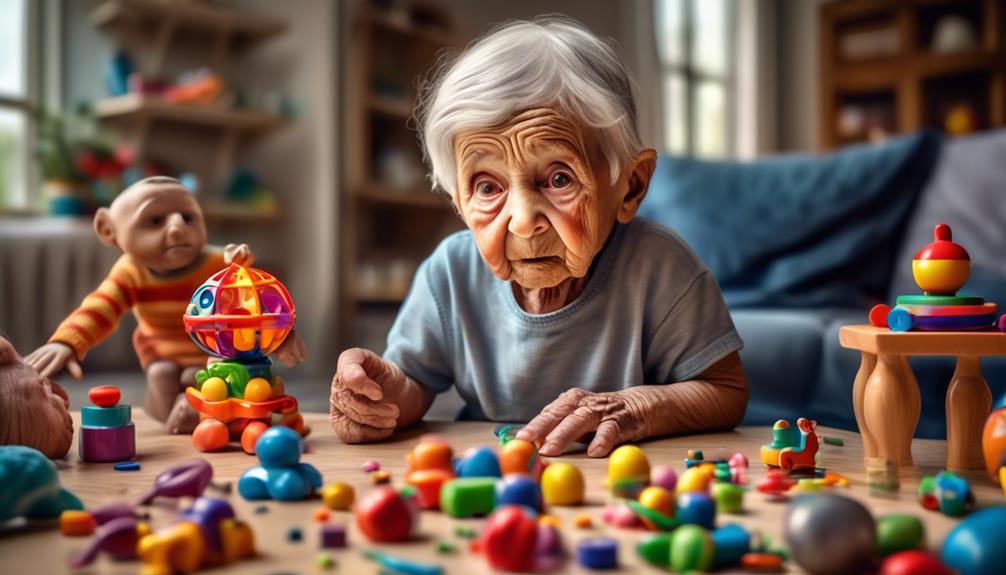Juggling the responsibility of parenting alongside the care of a family member with Alzheimer’s disease is like delicately balancing fragile glass orbs, each symbolizing a different facet of our lives.
The weight of responsibility can feel overwhelming at times, yet the rewards are immeasurable. As we strive to maintain equilibrium in this complex role, we discover depths of strength and resilience we never knew existed within us.
Join us as we explore the nuances of this dual caregiving journey, uncovering insights and strategies to nurture our families with love and compassion.
Key Takeaways
- Prioritize self-care for physical and mental well-being.
- Seek support from family, friends, and community resources.
- Establish a strong support system for caregiving challenges.
- Utilize practical routines and visual aids for organization and memory.
Challenges of Dual Caregiving Roles
Balancing the responsibilities of raising children and caring for a family member with Alzheimer's can be emotionally and physically challenging for caregivers. The weight of dual caregiving roles often leads to caregiver stress, as individuals navigate the demands of both caregiving responsibilities. This stress can manifest in various ways, impacting the caregiver's well-being and ability to provide adequate support to their loved ones.
In these situations, support groups can play a crucial role in helping caregivers cope with the challenges they face. Connecting with others who are going through similar experiences can provide a sense of community, understanding, and emotional support. Additionally, seeking guidance on legal and financial matters is essential when managing the care of a family member with Alzheimer's while raising children. Understanding legal rights, accessing financial resources, and planning for the future can help alleviate some of the burdens associated with caregiving responsibilities. By proactively addressing these aspects, caregivers can better navigate the complexities of dual caregiving roles while prioritizing their own well-being and that of their loved ones.
Balancing Family Needs

Effective time management and prioritization of tasks are crucial when juggling the needs of family members while caring for a loved one with Alzheimer's. Balancing family needs requires a delicate dance of meeting the demands of caregiving, family life, and personal obligations.
It's essential to communicate openly with family members to distribute caregiving responsibilities equitably and ensure everyone feels supported. Flexibility in scheduling is key, as the needs of the person with Alzheimer's may change, requiring adjustments to accommodate them while still tending to other family members.
Seeking caregiver support through community resources, support groups, and healthcare professionals can provide valuable assistance in managing the complexities of balancing family needs with caregiving duties. Remember, you aren't alone in this journey; reaching out for help and creating a network of support can lighten the load and help maintain a harmonious family dynamic amidst the challenges of Alzheimer's caregiving.
Self-Care Strategies
Navigating the demands of caregiving for a loved one with Alzheimer's can be overwhelming, making it essential to prioritize self-care strategies to maintain your physical and mental well-being. As caregivers, it's crucial to remember that taking care of ourselves enables us to provide better care for our loved ones. Seeking support from family, friends, or community resources can provide a much-needed break and emotional sustenance. Remember, you aren't alone in this journey, and reaching out for help is a sign of strength, not weakness.
Respite care is a valuable resource for caregivers, offering short-term breaks to recharge and focus on personal well-being. It's okay to take time for yourself; in fact, it's necessary. Adult day care centers can also offer a temporary reprieve while engaging your loved one with Alzheimer's in meaningful activities. Remember, self-care isn't selfish – it's a vital aspect of being a sustainable and effective caregiver. Prioritizing your own well-being ensures you can continue to provide the best possible care for your family member.
Seeking Support Systems

In caring for a family member with Alzheimer's, establishing a strong support system is essential for navigating the challenges and uncertainties that may arise. Caregivers can seek support through organizations like the Alzheimer's Association, which offer a wealth of resources and information tailored to Alzheimer's care. Online support groups and forums provide a platform for caregivers to connect with others facing similar challenges, offering a sense of community and understanding.
Attending caregiver support groups can be immensely beneficial, allowing caregivers to share experiences, receive emotional support, and learn effective coping strategies. These groups create a safe space for caregivers to express their feelings and concerns openly. Additionally, professional counseling services are available to help caregivers navigate the emotional and physical demands of caring for a loved one with Alzheimer's. Counseling can provide valuable tools and strategies for managing stress, anxiety, and the complexities of caregiving. With the support of these resources, caregivers can feel more equipped to handle the challenges that come with caring for a family member with Alzheimer's.
Practical Tips for Caregiving
Establishing practical routines and utilizing visual aids are key strategies to support individuals with dementia in their daily activities and enhance their quality of life. A structured daily routine can help the person with dementia feel more comfortable and secure, reducing confusion and anxiety.
Visual aids like calendars and to-do lists assist in memory and organization, making tasks more manageable. Consistent medication reminders are crucial for proper dosing and adherence, ensuring the person's health and well-being.
Encouraging independence in daily tasks such as dressing and bathing, while offering support when needed, promotes a sense of accomplishment and self-worth. Planning engaging activities at regular times provides mental stimulation and emotional well-being.
Caregiving for a person with dementia requires patience, understanding, and flexibility. By implementing these practical tips, caregivers can create a supportive environment that enhances the person's quality of life and fosters a sense of dignity and respect.
Frequently Asked Questions
How Do You Handle a Family Member With Alzheimer's?
We handle a family member with Alzheimer's by creating a safe environment, using clear communication techniques, establishing a routine, promoting independence, and seeking support. It's crucial to reduce confusion, provide structure, and offer assistance when needed.
We navigate the challenges by leaning on healthcare professionals, caregiver groups, and available resources. With empathy and knowledge, we strive to support our loved one through this journey.
How Does Alzheimer's Affect Family Caregivers?
Alzheimer's affects family caregivers profoundly. The stress, exhaustion, and emotional toll can be overwhelming. Balancing caregiving with work and family commitments presents significant challenges.
Caregivers may face job sacrifices, financial strains, and changes in family dynamics. The toll on caregivers' well-being is comparable to engaging in risky habits. It's crucial to recognize and support the immense impact Alzheimer's has on those caring for their loved ones.
What Not to Do When Caring for Someone With Alzheimer's?
When caring for someone with Alzheimer's, it's crucial to avoid correcting them, leaving them alone in unsafe situations, using complex language, rushing tasks, or taking their behavior personally. These actions can lead to frustration, confusion, and agitation for the individual.
Instead, maintain patience, provide a safe environment, simplify communication, and offer support with compassion. Remember, it's about creating a nurturing and understanding atmosphere for their well-being.
What Type of Support Is Available to Families and Patients With Alzheimer's?
We understand the importance of support for families and patients facing Alzheimer's. Various resources like educational materials, caregiver training, and local support groups are available.
Online communities and helplines offer advice and assistance. Clinical trials provide access to cutting-edge treatments.
Additionally, telehealth services allow convenient consultations with healthcare professionals. It's crucial to know that help is out there, and we're here to guide you through this journey.
Conclusion
In conclusion, navigating the dual roles of raising children and caring for a family member with Alzheimer's is like juggling flaming torches while walking a tightrope – challenging, but not impossible.
By prioritizing self-care, seeking support, and maintaining open communication, families can conquer any obstacle with grace and resilience.
Remember, we're all in this together, and with love, understanding, and a dash of humor, we can overcome any challenge that comes our way.
Stay strong, stay connected, and keep shining bright.









